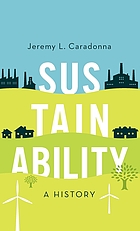 The Green and the Black
by
Gary Sernovitz
The Green and the Black
by
Gary Sernovitz
Call Number: TD195 .G3 S45
Publication Date: 2016
Gary Sernovitz leads a double life. A typical New York liberal, he is also an oilman - a fact his left-leaning friends let slide until the word "fracking" entered popular parlance. "How can you frack?" they suddenly demanded, aghast. But for Sernovitz, the real question is, "What happens if we don't?" Fracking has become a four-letter word to environmentalists. But most people don't know what it means. In his fast-paced, funny, and lively book, Sernovitz explains the reality of fracking: what it is, how it can be made safer, and how the oil business works.

 Sustainability
by
Jeremy L. Caradonna
Sustainability
by
Jeremy L. Caradonna